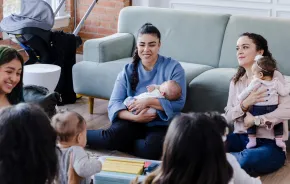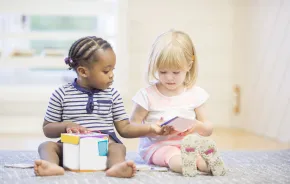 I’m guessing that I’m not the only parent who has heard the complaint “It’s not fair!” and recognized that there was some truth in your child’s words. What do you say to a child who has an internal justice meter tightly woven just beneath the skin?
I’m guessing that I’m not the only parent who has heard the complaint “It’s not fair!” and recognized that there was some truth in your child’s words. What do you say to a child who has an internal justice meter tightly woven just beneath the skin?
If you are like me there is a part of you that wants to respond with something that either dismisses the child’s concern or verges on sarcasm.
Things like:
“Buddy, you don’t know what fair is,” or
“Life isn’t always fair (get used to it),” or
“Fair doesn’t mean equal” or
“I get to decide what is fair or not fair.”
After all, as a parent you too want to be fair and you want to be appreciated for all of the hard work you do to be fair. Sometimes, in fact, it is fair and your complainer seems to be forgetting all of the times when he or she had a slight advantage.
But what do we really want long-term? Isn’t our child’s internal fairness meter a good thing? Don’t we want our sons and daughters to look at the world and stand up for injustice, for things that aren’t fair?
What are some ways to honor and even strengthen that inborn sense of fairness and justice and still maintain your dignity and role as the leader of the family? Here are some of our favorite tools:
Connection first. “Hmm, when your brother has a friend over it feels unfair. Tell me more.” Then listen. Your child feelings are real and he or she benefits from being heard. It is not your job to fix them.
Be curious about the real issue. “I’m wondering if this gives you the idea that I might love him more than I love you.” (Be ready with a hug.)
Use curiosity questions to help your child see other perspectives. “How do you think you would feel if you had a friend over and he didn’t?” “I wonder how often it is the person who is left out or gets less who notices the problem with fairness?” “Do you think there are other people in the world who might think that something is unfair and we don’t even notice?”
Allow feelings and invite solutions. Let your child know it is okay to feel disappointed that he doesn’t get what he wants right now. Brainstorm ideas that might help him feel a bit better. (Remember, this is not about bargaining to make things “fair” but to support your child in finding another way to feel important and/or connected to the people he/she loves.)
Model standing up for fairness and justice. It has been 50 years since four innocent African American girls were killed by a bomb planted by members of the Ku Klux Klan. Their deaths woke up part of a nation that had been turning a blind eye to years of injustice and a way of life that served some while unfairly denying basic rights to others.
We can look back 50 years and notice that there have been some changes but if we are honest with ourselves we don’t have to look far to see injustices. There are plenty in our community to choose from. Where can you be a voice for fairness? Seeing that everyone has access to basic healthcare? That all children start school with basic school supplies? That materials at your school are sent home in languages that each family can read?
 About the author
About the author
Jody McVittie, MD is the executive director and cofounder of Sound Discipline, a local nonprofit dedicated to teaching people to do the right thing, even when no one is looking. Sound Discipline works with schools and families in the Puget Sound Community.












